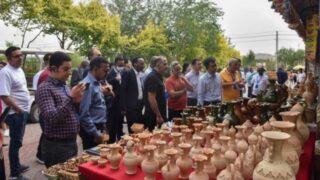Xinjiang Muslims who live outside the region are put under harsh surveillance and control, discriminated against under the pretext of “de-radicalization.”
by Wang Yong
Mr. Wang from the southeastern province of Jiangxi got to know and befriend an Uyghur working in his city through doing business with him. But he never expected that their contact would bring him so many troubles.
“There is a law on fighting terrorism in China, and it is widely applied. People from Xinjiang are branded as terrorists,” Mr. Wang told Bitter Winter. “If they live outside Xinjiang, they are required to register with the police station in the locality wherever they stay and call the police station where their hukou [household registration] is registered once a week.”
Mr. Wang’s friend became a target of police surveillance after he failed once to call the police station, as per requirements. Mr. Wang’s frequent association with the Uyghur aroused the attention of the police, and he was warned to stay away from Uyghurs because “they are terrorists.”
Mr. Wang dismissed the warning, and, not surprisingly, he got into trouble. He was soon taken away by police officers and was not released until he paid a fine of 2,000 RMB (about $ 285).
Almost impossible to rent an apartment
Mr. Wang revealed that because of the “terrorist” label, it’s challenging for Uyghurs to rent an apartment. “If people rent out to Uyghurs, the police will come to talk to them. To avoid troubles, landlords often decide not to rent their properties to Uyghurs. Similarly, no one dares to employ them,” the man explained.
Similar discriminatory practices are abundant across the country. One day in June, over a dozen police officers in Puyang county, administered by Puyang city in the central province of Henan, stormed into a property rented by an Uyghur couple. They ordered the landlord to force out the Uyghurs immediately.
The landlord tried explaining to the police that the couple’s contract was still active and that they were decent people, not causing any problems. Regardless, he was ordered to kick the couple out the same day, no matter what, or he would be held accountable “for any consequences.” The Uyghur couple were on the street the same day.
“Before the couple from Xinjiang were forced out, the police came to check on them at least once a month. They even prohibited them from doing business here,” the landlord told Bitter Winter. “Our village officials called me almost every day to inquire about them, telling me to kick them out and warning me not to rent to any people from Xinjiang. The government keeps finding faults with us. It’s so disturbing.”
Hotels obliged to report all Uyghurs
The “anti-terrorism” pretext is often used by the authorities to harass Uyghurs who have left Xinjiang to make a living elsewhere. The Public Security Bureau’s anti-terrorism unit in a county of Ulanqab city in Inner Mongolia required all local hotels earlier this year to sign a “statement of anti-terrorism responsibility.” They stated that the requirement is essential in “further strengthening the management of anti-terrorism work.” By signing the statement, hotels agreed not to accept people from Xinjiang to stay in their premises without prior government approval.
They are also obliged to report the ID information of anyone from Xinjiang who stays at their hotels to the anti-terrorism brigade. Otherwise, their business licenses would be revoked, hotels shut down, and owners will get into serious troubles and punished personally, the police threatened.


An employee at a hotel in Inner Mongolia recounted to Bitter Winter an incident that happened in July when a businessman from Xinjiang checked into the hotel with his wife and son. The proprietor immediately uploaded his identity information to the Security Information Management System, which is connected to the Public Security Bureau’s server. After less than 20 minutes, several SWAT police officers stormed into the hotel. They questioned the businessman in detail about his identity, the reason for his travel, or if they had relatives in the local area, and similar topics.


Face veils and beards seen as signs of terrorism
After the Xinjiang government issued in 2017 the Regulations on De-Radicalization in the Xinjiang Uyghur Autonomous Region, growing beards and wearing face veils were restricted. In other regions of China, people with these attributes started being treated as terrorists, subjected to strict control and persecution.
Even before that, the witch-hunt for so-called “terrorists” was gradually increasing across China, provincial and local authorities adopting “preventative measures.” Like, in March 2016, Manzhouli city’s anti-terrorism office in Inner Mongolia issued a notice, entitled All People Fight Against Terrorism: Regulations on Rewarding Active Informants Providing Terrorism-Related Clues. The document encourages all citizens to tip off the police about any men that have specific physical characteristics: bulging foreheads, big, deep-set eyes, bushy eyebrows, and beards. Any women with face veils or burqas have to be reported as well.









